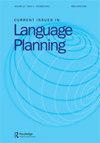Bulgarian language policy
IF 1.8
1区 文学
Q2 EDUCATION & EDUCATIONAL RESEARCH
引用次数: 0
Abstract
ABSTRACTThe paper presents some general facts about Bulgarian, which is spoken by over 8 million people all over the world and is the official language of the Republic of Bulgaria. It is shown that language diversity within the country has been relatively constant and modest over the last 90 years (with a clear dominance of Bulgarian). The focus of the paper is the presentation of the legislation in Bulgaria that regulates language teaching and use in different spheres of life, the main activities of the national institute of language, and the role of language education. The main findings are as follows: There is no dedicated Bulgarian Language Act. Instead, over 100 legislative acts govern issues concerning the usage and study of the Bulgarian language. The Institute for Bulgarian Language at the Bulgarian Academy of Sciences supports the Bulgarian state’s language policy through: researching the present state, history, and dialect variety of the Bulgarian language; monitoring changes in written and spoken language; publishing grammars and dictionaries; and developing language resources and technologies. The key factors that influence language education in Bulgaria include early childhood education and care, equity in education and educational outcomes, and the rise of new learning styles.KEYWORDS: Bulgarian languagelanguage policyofficial language protectionnational institute of languagereading literacy Disclosure statementNo potential conflict of interest was reported by the author(s).Notes1 https://www.nsi.bg/en/content/19806/прессъобщение/population-september-7-20212 https://population.un.org/unmigration/index_sql.aspx3 The information is from: https://www.ethnologue.com/language/bul/ (16 countries with less than 20,000 Bulgarians are not presented). The information for North Macedonia is taken from the annual reports of Bulgarian citizenship and the Bulgarians abroad committee, which are affiliated with the Bulgarian Presidency: https://m.president.bg/en/cat107/Godishni-dokladi-grajdanstvo.4 In detail in English, the features of the morphological structure of the Bulgarian language are presented by R. Nicolova (Nicolova, Citation2017).5 https://www.vatican.va/content/john-paul-ii/en/encyclicals/documents/hf_jp-ii_enc_19850602_slavorum-apostoli.html6 https://censusresults.nsi.bg/Census/Reports/2/2/R9.aspx7 https://www.nsi.bg/sites/default/files/files/pressreleases/Census2021-ethnos_en.pdf8 The number of dialects depends on the accepted classification.9 https://www.parliament.bg/en/const10 https://www.cem.bg/files/1651646128_zrt_eng.pdf11 https://ibl.bas.bg12 https://ibl.bas.bg/rbe/13 https://ibl.bas.bg/en/informatsiya/uslugi/elektronna-biblioteka/14 https://dcl.bas.bg/bulnet/15 https://ibl.bas.bg/dictionary_portal/lang/en/16 https://ibl.bas.bg/ezikovispravki/17 https://www.facebook.com/ezikovi.spravki/18 https://ibl.bas.bg/en/resursi/19 https://ibl.bas.bg/ezikovi_spravki/20 http://lll.mon.bg/uploaded_files/ZAKON_za_preducilisnoto_i_ucilisnoto_obrazovanie_EN.pdf21 https://www.oecd.org/pisa/22 https://www.oecd-ilibrary.org/sites/5c07e4f1-en/index.html?itemId=/content/component/5c07e4f1-en23 https://openknowledge.worldbank.org/server/api/core/bitstreams/66da1bc8-458c-5f73-858c-ea9e2a366872/content24 https://op.europa.eu/webpub/eac/education-and-training-monitor-2021/en/bulgaria.html25 https://op.europa.eu/webpub/eac/education-and-training-monitor-2022/en/country-reports/bulgaria.html26 https://op.europa.eu/webpub/eac/education-and-training-monitor-2021/en/bulgaria.htmlAdditional informationNotes on contributorsSvetla KoevaDr. Svetla Koeva is a professor of computational linguistics and the head of the Department of Computational Linguisticsat the Institute for Bulgarian Language, Bulgarian Academy of Sciences. Her research interests lie in the fields of computational linguistics, formal description of language (morphology and syntax), lexical-semantic networks, and ontologies. She is the principal investigator in the development of various language resources for Bulgarian, such as Bulgarian WordNet, Bulgarian National Corpus, language processing chain, etc. She served as the director of the Institute for Bulgarian Language from 2012 until 2021. Currently, she has been chair of the Research Council of the Institute for Bulgarian Language since 2021. Svetla Koeva is also the editor in chief of the Annual Papers of the Institute for Bulgarian Language and the weekly edition of The Written Word Remains. Write Correctly! Svetla Koeva has been awarded four prizes by the National Science Fund at the Ministry of Education and Science in Bulgaria and the Bulgarian Academy of Sciences.保加利亚语政策
摘要本文介绍了一些关于保加利亚语的一般事实,保加利亚语是保加利亚共和国的官方语言,全世界有800多万人使用。报告显示,在过去90年里,保加利亚的语言多样性相对稳定且适度(保加利亚语明显占主导地位)。本文的重点是介绍保加利亚在不同生活领域规范语言教学和使用的立法、国家语言研究所的主要活动以及语言教育的作用。主要发现如下:没有专门的《保加利亚语法》。相反,有100多项法律规定了有关保加利亚语文的使用和研究的问题。保加利亚科学院的保加利亚语研究所通过研究保加利亚语的现状、历史和方言多样性来支持保加利亚国家的语言政策;监测书面和口头语言的变化;出版语法和词典;开发语言资源和技术。影响保加利亚语言教育的关键因素包括幼儿教育和保育、教育公平和教育成果以及新学习方式的兴起。关键词:保加利亚语言政策官方语言保护国家语言研究所阅读素养披露声明作者未报告潜在的利益冲突。注1 https://www.nsi.bg/en/content/19806/прессъобщение/population-september-7-20212 https://population.un.org/unmigration/index_sql.aspx3信息来自:https://www.ethnologue.com/language/bul/(16个保加利亚人少于2万人的国家没有列出)。北马其顿的信息来自保加利亚公民身份和保加利亚海外委员会的年度报告,该委员会隶属于保加利亚总统:https://m.president.bg/en/cat107/Godishni-dokladi-grajdanstvo.4详细的英语,保加利亚语的形态结构特征由R. Nicolova (Nicolova, Citation2017)介绍。5 https://www.vatican.va/content/john-paul-ii/en/encyclicals/documents/hf_jp-ii_enc_19850602_slavorum-apostoli.html6 https://censusresults.nsi.bg/Census/Reports/2/2/R9.aspx7 https://www.nsi.bg/sites/default/files/files/pressreleases/Census2021-ethnos_en.pdf8方言的数量取决于公认的分类。ibl.bas.bg/en/informatsiya/uslugi/elektronna-biblioteka/14 https://dcl.bas.bg/bulnet/15 https://ibl.bas.bg/dictionary_portal/lang/en/16 https://ibl.bas.bg/ezikovispravki/17 https://ibl.bas.bg/en/resursi/19 https://ibl.bas.bg/ezikovi_spravki/20http://lll.mon.bg/uploaded_files/ZAKON_za_preducilisnoto_i_ucilisnoto_obrazovanie_EN.pdf21 https://www.oecd.org/pisa/22 https://www.oecd-ilibrary.org/sites/5c07e4f1-en/index.html?itemId=/content/component/5c07e4f1-en23 https://openknowledge.worldbank.org/server/api/core/bitstreams/66da1bc8-458c-5f73-858c-ea9e2a366872/content24 https://op.europa.eu/webpub/eac/education-and-training-monitor-2021/en/bulgaria.html25https://op.europa.eu/webpub/eac/education-and-training-monitor-2022/en/country-reports/bulgaria.html26 https://op.europa.eu/webpub/eac/education-and-training-monitor-2021/en/bulgaria.htmlAdditional information贡献者说明ssvetla KoevaDr。Svetla Koeva是保加利亚科学院保加利亚语言研究所计算语言学教授和计算语言学系主任。她的研究兴趣集中在计算语言学、语言的形式描述(形态学和句法)、词汇语义网络和本体论领域。她是保加利亚语各种语言资源开发的主要负责人,如保加利亚语WordNet、保加利亚国家语料库、语言处理链等。2012年至2021年,她担任保加利亚语言研究所所长。目前,她自2021年起担任保加利亚语言研究所研究委员会主席。Svetla Koeva也是《保加利亚语言研究所年报》和《文字遗存》周报的主编。写正确!Svetla Koeva获得了保加利亚教育和科学部国家科学基金和保加利亚科学院颁发的四项奖项。
本文章由计算机程序翻译,如有差异,请以英文原文为准。
求助全文
约1分钟内获得全文
求助全文
来源期刊

Current Issues in Language Planning
Multiple-
CiteScore
4.80
自引率
16.70%
发文量
26
期刊介绍:
The journal Current Issues in Language Planning provides major summative and thematic review studies spanning and focusing the disparate language policy and language planning literature related to: 1) polities and language planning and 2) issues in language planning. The journal publishes four issues per year, two on each subject area. The polity issues describe language policy and planning in various countries/regions/areas around the world, while the issues numbers are thematically based. The Current Issues in Language Planning does not normally accept individual studies falling outside this polity and thematic approach. Polity studies and thematic issues" papers in this journal may be self-nominated or invited contributions from acknowledged experts in the field.
 求助内容:
求助内容: 应助结果提醒方式:
应助结果提醒方式:


